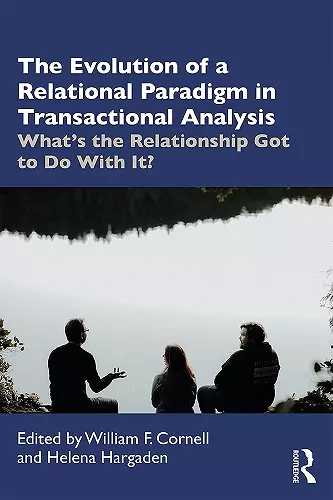The Evolution of a Relational Paradigm in Transactional Analysis
What's the Relationship Got to Do With It?
William F Cornell editor Helena Hargaden editor
Format:Paperback
Publisher:Taylor & Francis Ltd
Published:1st Oct '19
Currently unavailable, and unfortunately no date known when it will be back
This paperback is available in another edition too:
- Hardback£105.00(9780367259273)

In this fascinating and robust volume, the editors have compiled a collection of articles that provides an account of their individual theoretical journeys as they trace the evolution of relational transactional analysis. They re-examine the term ‘relational’, offering the reader a multiplicity of ways in which to conceptualise the theory of transactional analysis from a truly pluralistic perspective.
This collection of 14 stunning articles from the Transactional Analytic Journal, written over a period of nearly three decades, traces the evolutionary process of a way of thinking that incorporates both theoretical innovations and advanced methodological ideas. Central to the themes of this book is a theoretical understanding of the bidirectionality of the relational unconscious, alongside a methodology that not always, but most often, demands a two-person methodology in which the therapist’s subjectivity comes under scrutiny.
Uniquely useful as a research tool for psychotherapists interested in the most up to date psychological theories, this book offers a perspective on relational theory that is both respectful and critical. It will be of enormously useful to the trainee, the researcher, the clinician and the supervisor and will help inform the development of a clinical dialectical mind.
"Cornell and Hargaden are to be congratulated for editing a second and much revised edition of their original book on the emergence of a relational tradition in transactional analysis (TA). Taking account of the original material in the first volume as well as further developments over the past 15 years, the editors have selected articles that have been published in the international Transactional Analysis Journal which both honour the history of TA and question its emphasis on the therapist–client dyad and, more generally, its representation as a one-person psychology. Their choice of articles represents a two-person psychology and for this volume, specifically, the threads of relational TA that hold the centrality of transference and countertransference, and examine unconscious communication, enactments in contrast to games, and intersubjectivity.
The introduction alone is worth the price of the book as it weaves the editors’ original introduction to the first edition together with narratives of their own relationships with the relational; offers various critiques of the 'relational turn' both within and outside TA; and, overall, accounts for the impact of and interplay of our internal (intrapsychic) and external (social/political) worlds. I highly recommend this book." - Keith Tudor, Professor of Psychotherapy (Auckland University of Technology, New Zealand), Teaching and Supervising Transactional Analyst (International Transactional Analysis Association)
"These selected papers illustrate a collective journey of an integration of transactional analysis’s past into the present by reclaiming its psychoanalytic roots and then from that position evolving a contemporary, two-person relational psychology. The editors trace the development of a relational paradigm in transactional analysis with an emphasis on working with unconscious processes as they emerge within the transference/countertransference dynamics, enactments, eros and sexuality, and the therapist’s imaginative capacities.
Cornell and Hargaden demonstrate passionate commitments to their very different ways of thinking about, developing, and revising an approach in transactional analysis that stands alongside the contemporary thinking and practices of other psychodynamic psychotherapies." - Elana Leigh, Certified Transactional Analyst (CTA), Training and Supervising Transactional Analyst (TSTA), and President of the ITAA
"What is the significance in TA psychotherapy of being deeply recognised and responded to by another human being? This important book confirms the emergence of a new paradigm in TA that focuses on the live encounter in the therapeutic relationship. Developing the conscious and unconscious means to find new levels in the deconfusion of the Child ego states and enable transformational change is the significant aim and method of Relational TA.
Hargaden and Cornell have provided provocative and profound introductions to this collection of seminal articles, inviting us to integrate the vitality of experiential process into Berne’s more cognitive TA theory and method.
As the Relational paradigm in TA continues to evolve they warn against the development of a new dogma, invite self-critique, and see the limitations of the reparative models that have arisen in TA. Challenge, not security, is necessary for growth and they robustly stimulate our capacity for exploration, reflection, uncertainty, struggle and differentiation to create a living process between the theory and ourselves where new possibilities can emerge." - Adrienne Lee, Director of The Berne Institute, UK, university teacher and transactional analysis psychotherapist, supervisor and trainer for more than 40 years. Past Chair of the Institute of Transactional Analysis and past President of the European Transactional Analysis Association. Awarded the Muriel James Living Principles Award in 2017
ISBN: 9780367259280
Dimensions: unknown
Weight: 350g
198 pages